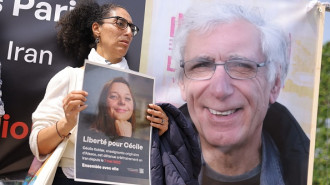Journalists face 'unprecedented' threats in Egypt
Journalists face unprecedented threats in President Abdel-Fattah al-Sisi's Egypt, a watchdog group said Thursday, with the highest number behind bars since it began keeping records in 1990.
In a report detailing the incarceration of 18 Egyptians, the New York-based Committee to Protect Journalists said most were accused of affiliation with the now-outlawed Muslim Brotherhood of ousted Islamist President Mohamed Morsi.
It said the threat of imprisonment in Egypt is part of a stifling atmosphere in which authorities pressure media outlets to censor critical voices and issue gag orders on sensitive topics, adding that Sisi has invoked national security to trample on liberties.
"CPJ spoke to high-level officials, including the prosecutor-general and the minister of transitional justice, who denied that Egypt was holding any journalists in jail in relation to their work," the group said in the report, which was based on a June 1 census of Egyptian prisons.
"But CPJ research shows that the government of Sisi has used the pretext of national security to crack down on human rights, including press freedom."
As army chief, Sisi overthrew Morsi in 2013 during massive protests against his rule, before winning a landslide election last year.
Since the overthrow, authorities have waged a massive crackdown on the Muslim Brotherhood and other opponents, killing hundreds, jailing thousands and sparking a backlash of attacks against security forces, mostly in the restive Sinai Peninsula.
Activists say dozens more journalists have been detained.
Cases detailed in the report show that most were jailed for covering protests, airing views contrary to the government or reporting on injustices committed against people affiliated with the Brotherhood, which Egypt considers a terrorist organisation.
Several stand accused of "spreading chaos," while others are charged with disseminating "false news" or anti-government messages.
In one case highlighted in the report, Mahmoud Abou-Zeid was arrested in August 2013 while taking photographs of the violent dispersal of a pro-Morsi sit-in, in which hundreds of Islamists were killed.
He has been in pre-trial detention since then and has not been formally charged.
"I spoke with him last week and he was tired and depressed," his brother, Mohamed, told The Associated Press.
"We don't know what will happen next and have no information regarding the future of the case. It is a very difficult situation for all of us."
In another case, photographer Omar Abdel-Maksoud was arrested in 2014 while covering a baby shower for a woman who had been detained and forced to give birth in a hospital in handcuffs.
Police launched a violent raid on the gathering, the report said, citing local media.
CPJ cited cases of journalists disappearing into Egypt's labyrinth of detention facilities without lawyers or family members knowing where they are, with court hearings sometimes taking place without their knowledge.
It said the heavy restrictions meant that scarce information emerges from entire regions, especially Sinai, where militant groups are fighting security forces and little is known about the conflict's toll on civilians.
One journalist from the area, Saeed Abuhaj, was arrested for carrying a leaflet bearing Brotherhood slogans, his lawyer said. He has been charged with inciting violence and using weapons against police.
Several high-profile cases involving the state's campaign against journalists have garnered international attention, most recently that of Ahmed Mansour, a journalist for Qatar-based broadcaster Al-Jazeera, who was stopped in Germany when officers there acted on an Egyptian arrest warrant.
After detaining him last weekend, German prosecutors decided Monday to free him and not pursue his extradition to Egypt, where he was convicted in 2011 on torture charges he denies.
CPJ and France's Reporters Without Borders criticised the detention.
Al-Jazeera has been a particular focus for Egypt following Morsi's overthrow, since the current government sees it as a mouthpiece for the Brotherhood.
Three journalists from its English-language channel are being retried on charges of being part of a terrorist group and airing falsified footage.
One of the three, Australian journalist Peter Greste, has been deported.
An Egyptian journalist not cited in the report said he and others, especially videographers and photographers, are regularly targeted when they cover Brotherhood-affiliated protests.
He spoke on condition of anonymity for fear of repercussions.
"They raided my family's apartment looking for me six times since 2013, and this month they smashed up a lot of furniture," he said, adding that he has been staying with friends.
"My work is a blessing and a curse — I'm living on the run."





 Follow the Middle East's top stories in English at The New Arab on Google News
Follow the Middle East's top stories in English at The New Arab on Google News

![The law could be enforced against teachers without prior notice [Getty]](/sites/default/files/styles/image_330x185/public/2178740715.jpeg?h=a5f2f23a&itok=xMdFOAIF)
